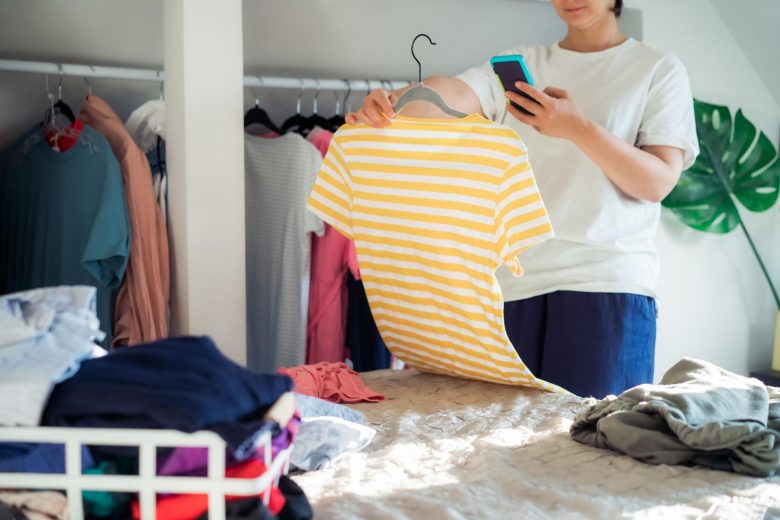Woman taking photo of t-shirt using her smartphone for selling or donating her clothes. Decluttering … [+]
Secondhand resale is by far the hottest segment in the global fashion market. Over the next five years, apparel resale is expected to grow more than three times faster than the primary market, from $96 billion in 2021 to $218 billion by 2026, according to the latest Thredup Resale Report, the most authoritative study of fashion resale.
And within the secondhand fashion market, online resale is growing the fastest, expected to reach over 50% of the market by 2024 and grow nearly four-times by 2026. To date, third-party marketplaces, such as Poshmark, Vestiaire Collective, eBay, The RealReal and Thredup, have enjoyed most of the largesse.
Though some brands have established their own resale programs, like Patagonia, Eileen Fisher, Lululemon and REI, other brands that want to get in on the action have largely partnered with Thredup using its Retail-As-A-Service offering. Macy’s, Target TGT and Gap GPS are among the most prominent names.
Now Recurate offers brands another alternative. Recurate is a technology platform that allows brands to get in on the ground floor with their own full-integrated resale capability on their ecommerce sites. And the service is not just limited to fashion, accessories and footwear, but electronics, outdoor gear and equipment branded companies as well.
Founded in 2020 by CEO Adam Siegel and COO Wilson Griffin, the company has just secured $14 million in Series A funding, bringing its total outside investment to over $17.5 million. The funds will be used to streamline brand integration, enhance data analytics capability and find solutions for brands to resell unsold inventory and product returns, along with exploring auctions and other upcycling opportunities.
“Recurate was founded to easily and seamlessly integrate resale into every commerce experience, increasing our brands’ sustainability, customer loyalty and revenue,” Siegel said in a statement.
Yelena Shkolnick, partner at Jump Capital, which led this investment round, added, “We expect the ease of purchasing and listing goods through brand sites will bring brands many new customers, help them retain existing customers and ultimately bring millions of customers to the circular economy.”
Unlike buy-back programs where the brand receives inventory from sellers, processes, warehouses and ultimately ships it to the next buyer, Recurate supports peer-to-peer resale.
Similar to Poshmark or eBay, under the peer-to-peer model the seller lists and ships their items directly to the buyer. Recurate says this model is the most scalable for a brand with minimal upfront and ongoing costs and allows the sellers to get the most value from their product.
Recurate solves for one of the weaknesses in the peer-to-peer model: authentication. It vets all listings and provides digital ID authentication. Its customer support team also handles queries and disputes.
But peer-to-peer models provide a key advantage to brands: more customer interaction and engagement. Customers are encouraged to come to the brand site not just to make a new purchase but to pass along a previous one. This puts a new spin on the traditional definition of the circular economy.
“In the branded resale model, there are so many opportunities to deepen the connection between the brand and the customer story and to build a community,” Griffin shared with Vogue Business. “That’s where we see branded resale fitting into the larger business these brands are developing.”
So far Recurate boasts more than 45 brands have signed onto its service, including Steve Madden (Re-Booted), Frye (The Frye Exchange), Ministry of Supply (Infinity Resale) and Mara Hoffman (Full Circle Marketplace). And the company expects the number to grow to over 100 partners by year end.
CEO Siegel considers the Recurate platform as the natural evolution of the resale market from third-party platforms to brands taking an ownership stake in the lifecycle of their products. And it gives brands a way to provide customers with added benefits from their ongoing relationships with them, essentially putting brand loyalty on steroids.
Dubbing this phase reale 2.0, he said, “Resale 1.0 was third-party marketplaces. They’ve made it cool and proved there’s a true market. Now brands are recognizing there’s an opportunity. They see their products sold on third-party platforms and think, why can’t we benefit from that?”
Author Profile
Latest entries
 राशीफल2024.04.19Aaj Ka Rashifal: मेष से लेकर मीन तक, जानिए 15 अप्रैल 2024, दिन-सोमवार का सभी राशियों का राशिफल – Aaj Tak
राशीफल2024.04.19Aaj Ka Rashifal: मेष से लेकर मीन तक, जानिए 15 अप्रैल 2024, दिन-सोमवार का सभी राशियों का राशिफल – Aaj Tak लाइफस्टाइल2024.04.19'OMG' 'शंभू' बनकर तांडव करते दिखे अक्षय कुमार, नए गाने में एक्टर का भयंकर अवतार – Punjab Kesari
लाइफस्टाइल2024.04.19'OMG' 'शंभू' बनकर तांडव करते दिखे अक्षय कुमार, नए गाने में एक्टर का भयंकर अवतार – Punjab Kesari धर्म2024.04.19Santoshi Mata: कैसे हुआ था मां संतोषी का जन्म, जानें पौराणिक कथा – TV9 Bharatvarsh
धर्म2024.04.19Santoshi Mata: कैसे हुआ था मां संतोषी का जन्म, जानें पौराणिक कथा – TV9 Bharatvarsh विश्व2024.04.19Russia: 'सब लोग चिल्ला रहे थे, इधर-उधर भाग…', मॉस्को में हुए आतंकी हमले के दौरान मौजूद लोगों ने बताई आपबीती – अमर उजाला
विश्व2024.04.19Russia: 'सब लोग चिल्ला रहे थे, इधर-उधर भाग…', मॉस्को में हुए आतंकी हमले के दौरान मौजूद लोगों ने बताई आपबीती – अमर उजाला











